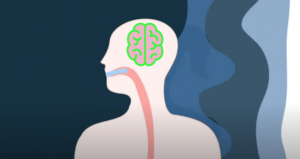Have you ever had a gut feeling that something wasn’t quite right? Or maybe felt butterflies in your stomach before an important event? It turns out that our digestive system and mental health are closely intertwined. Recent research has shown that what we eat and how it affects our gut can profoundly impact our brain, mood, and overall well-being. In this blog post, we’ll explore the fascinating connection between the gut-brain axis and learn how taking care of our digestion may be one of the most important things we can do for our mental health.
What is the Gut-Brain Connection?
The gut-brain connection is a relatively new field of study that is beginning to reveal how our digestive system affects our mental health. The gut is home to a complex ecosystem of bacteria, many essential for our health. This microbiome interacts with the nervous system and can influence our mood, behaviour, and overall mental health.
There is growing evidence that disruptions in the gut microbiome may play a role in various mental disorders, such as anxiety, depression, and autism. For example, studies have shown that people with depression tend to have different types of gut bacteria than those without depression. Additionally, researchers have found that giving probiotics (healthy bacteria) to people with anxiety or depression can help reduce symptoms.
While the research on the gut-brain connection is still in its early stages, it provides promising insights into how our digestive system influences our mental health. By better understanding this connection, we may be able to develop new and more effective treatments for mental disorders.

Physical Symptoms of Poor Gut Health
There are a number of physical symptoms associated with poor gut health. These can include bloating, constipation, diarrhea, abdominal pain, and nausea. All of these symptoms can have a significant impact on your overall well-being and quality of life. If you are experiencing any of these symptoms, it is important to see a doctor or other healthcare provider to rule out other possible causes and to get the treatment you need.
Scientific Evidence Supporting the Connection
The human gut is home to trillions of microbes essential for maintaining a healthy digestive system. The gut microbiota has been shown to affect the development and function of the nervous system. Research suggests it may also be involved in brain disorders such as autism, depression, and anxiety.
Animal studies have shown that the composition of the gut microbiota can influence behaviour and cognition. For example, mice with a specific type of gut bacteria are more likely to show signs of anxiety than those without these bacteria. Additionally, when the gut microbiota is altered through antibiotic treatment or other means, there are changes in brain chemistry and behaviour. These findings suggest that the gut microbiome plays a significant role in brain function and mental health.
In humans, several studies have found an association between gut health and mental health. For example, people with irritable bowel syndrome (IBS) are more likely to report symptoms of anxiety and depression than those without IBS. Additionally, individuals with gastroenteritis are at increased risk for developing psychiatric disorders such as PTSD. There is also evidence that the gut microbiota is involved in neurodevelopmental disorders such as autism spectrum disorder (ASD).
While more research is needed to understand the mechanisms by which the gut microbiome affects mental health, the available evidence supports a strong connection between these two systems. Gut health is essential for overall well-being.
There are a few ways that diet can impact mental health:
- Nutrient Deficiencies: Certain nutrients are essential for proper brain function. When we are deficient in these nutrients, it can lead to problems with mood, memory, and focus. For example, deficiencies in omega-3 fatty acids have been linked to depression and anxiety (1).
- Inflammation: Inflammation is a normal immune response to injury or infection. However, when inflammation becomes chronic, it can contribute to conditions like depression and anxiety. Some foods can promote inflammation, while others can help to reduce it. For example, refined carbohydrates and sugar can trigger inflammation, while omega-3 fatty acids have anti-inflammatory effects.
- Gut microbiota: The gut microbiota is the community of microorganisms that live in the digestive tract. This community plays an important role in many aspects of health, including mental health. Think of the gut as a garden, the more flourishing a garden is, the happier the other plants and animals that call it home. This is the same for your gut, when the good bacteria is thriving so are you!
How to Improve Your Gut Health
There are a few different ways that you can improve your gut health and in turn, your mental health.
- First, eat plenty of probiotic-rich foods like yogurt, kimchi, and sauerkraut. These foods contain beneficial bacteria that can help to support a healthy gut microbiome. Can’t eat enough probiotic-rich foods? Easy, use a proven supplement like GUTHEALTH+. GH+ is proven to reach the digestive tract and is not sensitive to heat or cold.
- Get plenty of fibre in your diet, especially fermentable fibre in the form of resistant starch. Fibre helps to keep things moving along in the digestive tract and can also help to feed the good bacteria in the gut. Good sources of fibre include green bananas, fruits, vegetables, whole grains, and legumes, or 1 tablespoon of GH+ Green Banana Resistant Starch – the richest source of resistant starch on earth.
- Exercise, light walking, jogging, yoga or bike riding helps get your body moving and producing endorphins which are great for cellular rejuvenation and the whole body feeling.
- Drink water! Swap out juice or after midday swap out the coffee for a tall glass of water to get hydrated.
- Get a good nights rest, sleeping is important, especially deep REM sleep, for body, brain and cellular renewal.

The gut-brain connection is an important one that we must pay attention to. Our digestive health directly impacts our mental well-being and vice versa. Paying attention to your physical and mental health is essential to promote overall wellness. To do so, you should ensure that you eat a healthy diet full of fibre and probiotics, exercise regularly, manage stress levels through relaxation techniques or counselling if needed, and seek help from a qualified professional. Being aware of the gut-brain connection can be beneficial for improving your quality of life both physically and mentally.
